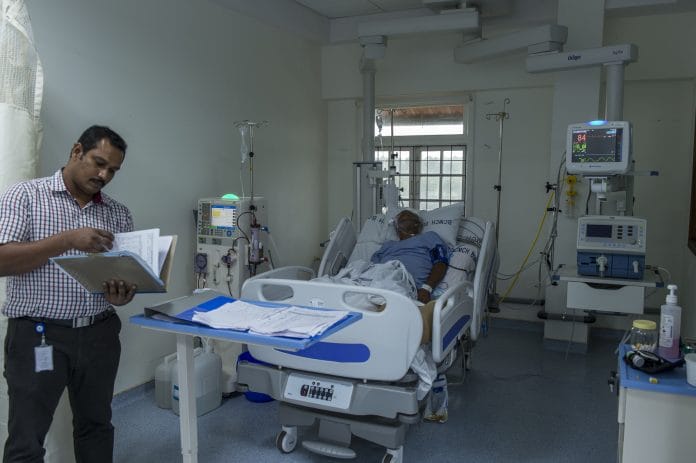New Delhi: The Modi government is cracking down on alleged fraud in its centrepiece health scheme Ayushman Bharat following the discovery of malpractice by several doctors and hospitals.
States have been asked to submit reports on action taken over instances of alleged fraud discovered since the scheme’s launch nine months ago. While over 30 lakh patients have been treated under the scheme, there’s reportedly been a spurt in cases involving fraudulent claims.
Just this month, investigation has been launched against 11 hospitals in Uttarakhand for allegedly claiming money in the name of ghost patients: The state requires Ayushman Bharat beneficiaries to secure a referral from government doctors before they approach private hospitals, and several instances of fraud are believed to have involved a nexus of government and private doctors.
Around 700 such cases have reportedly been discovered in Uttarakhand alone. While some of the hospitals have been delisted from the scheme, all have been slapped with penalties that total over Rs 1 crore.
Speaking to ThePrint, Ayushman Bharat CEO Indu Bhushan said “tightening the noose against fraud mechanism is an evolving process”.
“We already have a strong system in place for tracking frauds. We have to be a step ahead of the fraudsters and cheaters,” he added.
On alert
Ayushman Bharat is among the Modi government’s flagship initiatives, promising poor families Rs 5 lakh in annual health insurance. It has been touted as the world’s largest health insurance scheme.
Over the past year, the central government has kept a constant eye out for alleged attempts to manipulate the system.
In December 2018, Bhushan was quoted talking about investigations launched after the detection of seemingly spurious claims: When a woman aged below 30 underwent a hysterectomy or removal of uterus, and a man younger than 50 went through a cataract surgery.
The fraud detected so far varies in nature: At times, non-beneficiaries are treated under the scheme and both the government and the patient are charged, and claims are also made in the names of patients who don’t exist. In Uttarakhand, patients were allegedly asked to pay bribes for referrals to private hospitals.
“We have also seen cases where the actual treatment was of a lesser amount but the reimbursement bill (submitted to the government) was exaggerated,” said a senior official from the Ministry of Health working on the scheme.
“The scheme has used the skeleton of Rashtriya Swasthya Bima Yojana (RSBY, which Ayushman Bharat has subsumed) which earned notoriety for Bihar’s uterus removal scam,” the official added, referring to the 2012 outrage that saw hundreds of women allegedly undergo unnecessary hysterectomies, often misled by a nexus that allegedly included doctors and government officials who wanted to pocket the insurance money.
“Hence, chances of misuse are high if the fraud-checking mechanism is weak,” the official added.
The government consequently monitors treatment packages that are particularly vulnerable to misuse.
“Nearly 60 per cent of treatments under the scheme are being carried out by private hospitals. The treatments which were prone to fraud or abuse, such as mental healthcare and c-section deliveries, are restricted to public sector hospitals in most states,” the health ministry official said. “However, based on the feedback of the states, we may restrict more procedures to public hospitals.”
Also read: Why Modi’s Ayushman Bharat failed in Nitish Kumar’s Bihar as encephalitis killed over 120 kids
Asking states to crack down
The letter to state governments has been written by the National Health Authority (NHA), an autonomous entity set up for the effective implementation of Ayushman Bharat, formally known as Pradhan Mantri Jan Arogya Yojana (PM-JAY). States run the scheme through state health agencies (SHA), which are mandated to conduct independent audits for a minimum 10 per cent of approved cases and 100 per cent of mortality cases.
Among other things, the NHA has asked every state to submit the details of the state’s anti-fraud units (SAFU), with an aim to examine their working. The details sought to include team composition, designated role for each member and nodal officer’s name, designation and contact details.
As mentioned earlier, it has also asked for reports on the action taken against hospitals that came under the scanner following joint audits by NHA teams and state representatives.
“It is observed that some state health authorities have returned the file without adequate comments or due diligence while confirming the cases as false positives or frauds,” said the letter dated 7 June, written by NHA and Ayushman Bharat CEO Bhushan. The letter was accessed by ThePrint.
“The national anti-fraud unit has shared the list of hospitals outlier cases for investigation by the state’s anti-fraud units. The state health agency’s (sic) are requested to share their findings and action-taken report,” the letter said.
Teaming up with insurance regulator
The insurance industry regulator, The Insurance Regulatory and Development Authority of India (IRDA), has started helping the NHA detect and deter fraud “through a common repository and capacity building”.
“It will develop standards for field verifications and investigations besides guidelines to “name and shame” fraudsters,” said a report in The Hindu Businessline this March.
Also read: Delhi health scheme better than Ayushman Bharat, Kejriwal says in letter to Harsh Vardhan






